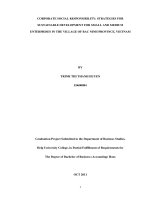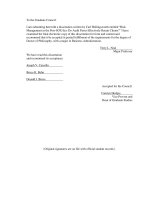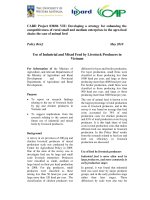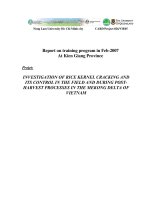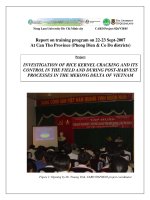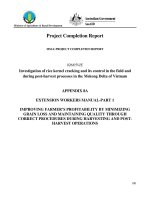Reproducing vietnam television and national imagination in the post reform era
Bạn đang xem bản rút gọn của tài liệu. Xem và tải ngay bản đầy đủ của tài liệu tại đây (1.46 MB, 188 trang )
Reproducing Vietnam:
Television and National Imagination in the Post-Reform Era
Giang Thu Nguyen
BA Vietnam National University, MA Vietnam National University
A thesis submitted for the degree of Doctor of Philosophy at
The University of Queensland in 2016
School of Communication and Arts
Abstract
This thesis investigates the relationship between television and the national imagination in Vietnam
after the 1986 Reform. Being a distinctive cultural product of the post-Reform era, television serves
as an enabling site to understand how nationalist practices in Vietnam, once heavily constrained by
warfare and socialist politics, have evolved and changed in the new era of peace, marketization and
globalisation. I draw on the Foucauldian framework of governmentality to analyse television as a
diverse set of technologies of power, with discourses, genres and practices that significantly involve
and alter the governing of national subjects. Here the Vietnamese nation is understood not as a
homogenous entity, but rather as plural and changing forms of cultural government enabled by the
articulations of multiple realities, each centred on the regulating role of television. The key
concerns of this thesis are thus the multiplicity, rupture and the limits of nationalist practices in
Vietnam as affected by the recent development of television.
Using a combination of archival research, textual analysis and semi-structured interviews, I
examine the various contexts, texts and actors of post-Reform television to delineate different
patterns of national formation. I trace the historical trajectory of Vietnamese television from being a
rare cultural activity before the Reform to becoming an important part of everyday post-Reform
practice. In the context of this historical background, I investigate three major case studies of how
selected Vietnamese television programs have intervened in the process of national formation. The
first compares two popular television dramas, Hanoian (“Người Hà Nội”) and The City Stories
(“Chuyện Phố Phường”), to demonstrate how post-Reform television dramas enable different ways
of remembering the national past, leading to the pluralisation of a sense of national belonging, with
each version established within a distinctive setting of collective memory. The second case study
examines Contemporaries (“Người Đương Thời”), one of the most famous talk shows on
Vietnamese television. The direct connection made between personal success and national pride in
this talk show demonstrates how the driving force of nationalism in post-Reform Vietnam is no
longer a political duty, as seen in the previous socialist era, but rather a market impulse whereby
each individual is treated as an active entrepreneur in changing a poor country. The last case study
turns to the generation of national belonging by affect through the examination of As if We Never
Parted (“Như Chưa Hề Có Cuộc Chia Ly”), a prominent Vietnamese reality show that reunites
missing people. This show permits the voicing of ordinary people’s traumatic experience, and in so
doing offers the prospect of healing and reconciliation. But because national traumas are reduced to
a matter of affective experience, the healing effect enabled by this reality show is mainly achieved
on the scale of intimate feeling, leaving the question of systemic inequality unanswered.
ii
The case studies demonstrate how the nation continues to be an important point of public reference,
reflecting the rich legacy of nationalist movements in the recent history of Vietnam, particularly
pre-Reform socialism. At the same time, the post-Reform concept of the nation has departed from
the previous model of socialist ideology—a model that was imprinted by warfare, collectivism and
state monopoly. Nationalist discourses are increasingly being shaped by personalising and
marketising forces. The nation persists in the new era of marketisation and globalisation, but only at
the cost of the destabilisation of the old socialist hierarchy. Such destabilisation allows the local, the
national and the global to be integrated in a much more flexible and contingent manner, in which
Vietnamese television operates as both an important component and a productive organiser.
This thesis contributes to the field of cultural studies by investigating the work of television as
framed by the rare combination of late-socialist politics and neoliberal globalisation. I also provide
a historical analysis of the impressive development of Vietnamese television after the Reform,
something that has been surprisingly absent in the field of Vietnamese studies. Theoretically, I
adapt Michel Foucault’s insights about power to understand nationalism, a topic rarely touched by
Foucault or his followers. My empirical engagement with Vietnamese television also allows me to
reveal some mismatch between Foucault’s perspective of power and the specific reality of late-
socialist nationalism. While Foucault emphasises the divergence between governmentality and
sovereignty, this thesis demonstrates how these two modalities of power are often complicit with
each other, and how sovereignty retains a greater significance than Foucault often acknowledges.
iii
Declaration by author
This thesis is composed of my original work, and contains no material previously published or
written by another person, except where due reference has been made in the text. I have clearly
stated the contribution by others to jointly authored works that I have included in my thesis.
I have clearly stated the contribution of others to my thesis as a whole, including statistical
assistance, survey design, data analysis, significant technical procedures, professional editorial
advice and any other original research work used or reported in my thesis. The content of my thesis
is the result of work I have carried out since the commencement of my research higher degree
candidature and does not include a substantial part of work that has been submitted to qualify for
the award of any other degree or diploma in any university or other tertiary institution. I have
clearly stated which parts of my thesis, if any, have been submitted to qualify for another award.
I acknowledge that an electronic copy of my thesis must be lodged with the University Library and,
subject to the policy and procedures of The University of Queensland, the thesis be made available
for research and study in accordance with the Copyright Act 1968 unless a period of embargo has
been approved by the Dean of the Graduate School.
I acknowledge that copyright of all material contained in my thesis resides with the copyright
holder(s) of that material. Where appropriate, I have obtained copyright permission from the
copyright holder to reproduce material in this thesis.
iv
Publications during candidature
Nguyen-Thu, Giang. “Nostalgia for the New Oldness: Vietnamese Television Dramas and National
Belonging.” Media International Australia 153 (2014): 64–72. Print.
Nguyen-Thu, Giang “Personal Wealth, National Pride: Vietnamese Television and Commercial
Nationalism.” Commercial Nationalism: Selling the Nation and Nationalizing the Sell. Ed.
Zala Volcic and Mark Andrejevic. New York: Palgrave Macmillan, 2015. 86–105. Print.
Publications included in this thesis
No publications included.
Contributions by others to the thesis
No contributions by others.
Statement of parts of the thesis submitted to qualify for the award of another degree
None.
v
Acknowledgements
I wish to express my deep gratitude to my principal advisor, Maureen Burns, for her inspiring
guidance. Without her astute comments, which were always delivered with warm and sincere
encouragement, this thesis would not have been completed. Being an international student who uses
English as a second language, I appreciate the way Maureen patiently guided me through my
academic writing, which I know was extremely time-consuming. Maureen left the best impression
of the Australian academy in my mind. My acknowledgement is also due to my associate advisor,
David Carter, for his thoughtful comments in the development and completion of this thesis. Each
meeting with David was always full of useful instruction and stimulating discussion.
Catherine Lawrence has been the most wonderful friend I could ever wish for in a foreign land. I
thank her for being my patient and critical test audience in almost all of my oral presentations. I
appreciate her spending time with me over a cup of coffee talking about our families, our studies
and our dreams. I thank her for her careful reading of many of my drafts and her charming gifts for
my little daughter each time we met. Cathi’s unfailing encouragement throughout my PhD
candidature made me feel a very lucky person.
My thanks is also to Nguyễn Như Huy, a friend in Vietnam who encourged me to embark on this
PhD journey. Only through our endless discussion about Vietnamese society could I formulate the
very first ideas about my project. Huy reminded me that the task of an academic person is to raise a
local voice in ways that can build a bridge between Vietnam and the world.
I thank Gay Hawkins for inviting me to many enlightening events organised by the Centre for
Critical Cultural Studies at the University of Queensland. I appriciate her suggestions for useful
readings and her instruction on many of my theoretical concerns. I thank Zala Volcic for discussing
various aspects of nationalism with me and for her invitation to contribute to a book edited by her
and Mark Andrejevic.
My sincere thanks are due to the interviewees who participated in this study: Nguyễn Danh Dũng,
Đỗ Thanh Hải, Đỗ Minh Hoàng, Nguyễn Khải Hưng, Bùi Thị Lan Hương, Tạ Bích Loan, Trần
Ngọc Minh, Phạm Thanh Phong, Tạ Minh Phương, Bùi Thu Thủy, Nguyễn Phạm Thu Uyên. All of
my interviewees are busy television producers, so I truly appriciate their participation. I thank Bùi
Thu Thủy, Nguyễn Thu Yến, Tạ Bích Loan, Bùi Thị Lan Hương for their efforts to help me connect
with many producer interviewees, and for their help that allowed me to access the archive of
Vietnam Television.
This study is fully funded by the Australia Awards Scholarship. I thank the Australian Government
for its generousity and support throughout my PhD. In addition to receiving an Australian Awards
vi
Scholarship, I also acknowledge the receipt of the 2015 Dr John McCulloch Memorial Prize as part
of the annual Work-in-Progress (WiP) Conference organised by the School of Communication and
Arts at the University of Queensland.
I thank the Shephard family for their wonderful hospitality and love.
All my love and gratitude is to Tuấn, my husband, who quit his job in Vietnam to stay for four
years in Australia to support my study. His care, calmness and maturity provided me with homely
security that reduced so much stress during the PhD journey. I also thank my daughter Hà, who
patiently waited for me every day to finish my work before I turned to her for reading and chatting.
I thank Khôi, my newborn son, for bringing so much joy and hope in the last year of my
candidature. I thank my father and my mother-in-law for their love from Vietnam.
I dedicate this thesis to my mother, who passed away in the first month of my PhD journey. Her
unconditional support for my study and my dream stays with me forever.
July 2016
vii
Keywords
Vietnamese television, Vietnamese nationalism, Vietnamese Reform, Doi Moi, Foucault,
governmentality, subjectivity.
Australian and New Zealand Standard Research Classifications (ANZSRC)
ANZSRC code: 200299, Cultural Studies not elsewhere classified, 80%
ANZSRC code: 190204, Film and Television, 20%
Fields of Research (FoR) Classification
FoR code: 2002, Cultural Studies, 80%
FoR code: 1902, Film, Television and Digital Media, 20%
viii
Contents
Abstract ........................................................................................................................................ ii
Declaration by author ................................................................................................................ iv
Acknowledgements..................................................................................................................... vi
A Note on Diacritics and Names ............................................................................................... xi
List of Vietnamese Television Programs Mentioned in the Thesis.......................................xii
Preface ....................................................................................................................................... xiv
Introduction: Nation, Television, Governmentality................................................................. 1
The Case Studies: Text and Context ......................................................................................... 3
Everyday Nationhood: Beyond the Politicised Image of Vietnamese Nationalism ................. 5
Television and the Nation: Questioning the Prohibition Model ............................................. 10
Putting Things Together: From Discourse to Governmentality.............................................. 14
National Formation as Cultural Government.......................................................................... 16
Research Questions ................................................................................................................. 19
On Methods............................................................................................................................. 20
Thesis Outline ......................................................................................................................... 22
Chapter 1 Television Dramas and the Return of Normalcy ................................................. 26
Pre-Reform Television: A History of Disruption and Scarcity............................................... 26
The Rich Also Cry and the Return of Normalcy ..................................................................... 30
Television Dramas as Tactical Resistance .............................................................................. 34
Television Dramas, Everyday Life and the Dispersal of Power ............................................. 42
Television Dramas: Technology of Domination and Technology of the Self ........................ 45
Chapter 2 Nostalgia for the New Oldness ............................................................................... 50
Early Vietnamese Television Dramas and the Charm of Nostalgia........................................ 50
Nostalgic Drama as Cultural Government .............................................................................. 52
Melodramatic Nostalgia as “Memory Dispositif”................................................................... 54
Dispositif One: Hanoian and the Bitter Flavour of Nostalgia ................................................ 56
Dispositif Two: The City Stories and the New Oldness.......................................................... 59
Chapter 3 From Socialist Moralism to Market Ethics .......................................................... 67
SV’96 and the Arrival of Ordinary Television ........................................................................ 68
The Limitation of the State-centred Approach ....................................................................... 72
ix
Participation, Governmentality and Subjectivity .................................................................... 75
Beyond Socialist Moralism ..................................................................................................... 80
Chapter 4 Personal Wealth, National Pride and Neoliberalism ........................................... 88
Nation, Market, Media: The Context of Contemporaries....................................................... 89
Autonomisation and Responsibilisation: The Collective Logic of Neoliberalism ................. 90
A Nation of Self-Mastery........................................................................................................ 92
The Inward Logic: Personal Wealth, National Strength ......................................................... 98
The Outward Logic: Global Market, Vietnamese Dream..................................................... 104
Between Neoliberalism and Socialism ................................................................................. 108
Chapter 5 Collective Wound, Private Healing and National Reconciliation.................... 110
Separated in Wars, Reunited on Reality Show ..................................................................... 110
Visceral Privatisation: Biopower, Affect and Nationality .................................................... 112
The Public Status of Trauma: From Resisting Sovereignty to Practising Biopower............ 114
Embodying the Weary Nation............................................................................................... 119
Neoliberal Remedy upon Socialist Pain................................................................................ 128
Reconciliation “At Heart”: Love Heals Us All ..................................................................... 132
Conclusion: Fraternity without Uniformity ......................................................................... 138
Wider and Deeper: Nation, Neoliberalism and Globalisation .............................................. 139
Sovereignty and Governmentality: Between Resistance and Complicity ............................ 144
Works cited .............................................................................................................................. 149
x
A Note on Diacritics and Names
Vietnamese words have vastly different meanings, and sometimes are unpronounceable without
diacritical marks. I thus include the original diacritical marks when I refer to Vietnamese names and
texts. There are some exceptions with popular terms widely known outside Vietnam, such as
Vietnam, Ho Chi Minh, Viet Cong, Hanoi, Saigon, Hue, Da Nang and so forth. These exceptions
are for practical purposes to reduce confusion for readers who are unfamiliar with the Vietnamese
language.
I refer to Vietnamese people (who are mostly my interviewees and those appearing on television)
by their first name instead of their surname because this is how we properly identify people in
Vietnam. In television shows or dramas, the surnames of participants and characters are normally
unknown. Non-Vietnamese people are all referred to by their surnames, following the Western
norm.
Names of television programs are translated into English after the first reference to their original
Vietnamese names because the meaning of a program’s title is needed to understand the analysis. A
list of mentioned programs and their Vietnamese titles is provided below.
xi
List of Vietnamese Television Programs
Mentioned in the Thesis
(In order of appearance)
English title Vietnamese title Type of content
Hanoian Người Hà Nội Vietnamese Television Drama
The City Stories Chuyện Phố Phường Vietnamese Television Drama
Contemporaries Người Đương Thời Vietnamese Talk Show
As if We Never Parted Như Chưa Hề Có Cuộc Chia Ly Vietnamese Reality Show
The Rich Also Cry Người Giàu Cũng Khóc Mexican Telenovela
Simply Maria Đơn Giản Tôi Là Maria Mexican Telenovela
Oshin Osin Japanese Television Drama
Yearnings Khát Vọng Chinese Television Drama
Return to Eden Trở lại Eden Australian Television Drama
The Little House on the Ngôi Nhà Nhỏ Trên Thảo Nguyên American Television Drama
Prairie
Emotions Cảm Xúc Korean Television Drama
Culture and Arts on Văn Nghệ Chủ Nhật Vietnamese Variety Show
Sunday
Well, Just You Wait Hãy Đợi Đấy Russian Cartoon
Tom and Jerry Tom và Jerry American Cartoon
The Abandoned Field: Cánh Đồng Hoang Vietnamese Movie
Free Fire Zone
12A and 4H 12A và 4H Vietnamese Television Drama
The People Around Me Những Người Sống Bên Tôi Vietnamese Television Drama
Southern Beauty Người Đẹp Tây Đô Vietnamese Television Drama
The Southern Land Đất Phương Nam Vietnamese Television Drama
The Story of Mộc Chuyện Nhà Mộc Vietnamese Television Drama
The Saving Của Để Dành Vietnamese Television Drama
An Unpaid Do-gooder Người Vác Tù Và Hàng Tổng Vietnamese Television Drama
The Falling Season Mùa Lá Rụng Vietnamese Television Drama
The Path of Life Đường Đời Vietnamese Television Drama
SV’96 SV’96 Vietnamese Game Show
Dramas on Friday Phim Truyện Tối Thứ Sáu Vietnamese Drama Program
Evening
Interville Trò Chơi Liên Tỉnh Franchised Game Show
xii
Wheel of Fortune Chiếc Nón Kỳ Diệu Franchised Game Show
Who Wants to Be a Ai Là Triệu Phú Franchised Game Show
Millionaire?
The Price is Right Hãy Chọn Giá Đúng Franchised Game Show
Vietnam Idol Thần Tượng Âm Nhạc Việt Franchised Reality Show
Vietnam’s Next Top Model Người Mẫu Việt Nam Franchised Reality Show
Vietnam Amazing Race Cuộc Đua Kỳ Thú Franchised Reality Show
Master Chef Vietnam Vua Đầu Bếp Franchised Reality Show
The Voice Giọng Hát Việt Franchised Reality Show
Stay at Home on Sunday Ở Nhà Chủ Nhật Vietnamese Game Show
Seven Shades of Rainbow Bảy Sắc Cầu Vồng Vietnamese Game Show
Road to Mount Olympus Đường Lên Đỉnh Olympia Vietnamese Game Show
xiii
Preface
I am a member of the first Vietnamese generation that literally grew up with a television set. My
age group, the so-called “8x generation” (thế hệ 8x) famed for its innovative spirit in Vietnam, was
the first batch of post-war babies born in the 1980s—just in time for the rapid development of the
television industry. In 1986, the newly bought JVC TV—a second-hand item sourced from Japan—
was perhaps the most valuable appliance in our tiny apartment in Hanoi, a symbol of our improved
lifestyle after a decade of food shortages and cultural isolation. We turned television on any time we
could (at night mainly, and if there was electricity) because its visual appeal immediately added
excitement to our formerly boring evening ritual.
For many years, around the dining table, my parents took every opportunity to relate to us stories of
their past—many of which were inspired by the content on the small screen. One story led to
another: half-forgotten memories re-elaborated, sorrowful tragedies brightened up by joyful details,
bitter disappointment mixed with delightful nostalgia. With television as our backdrop, I learned
about my parents and my grandparents’ survival journeys, blended with various collective
milestones: the devastating famine in the mid-1940s, several wars, waves of political migration and
decades of destitution. I had never witnessed most of these events myself, but somehow they still
formed a part of my personal memory through my intimate connection with my parents. In this
way, television stimulated dialogues that connected me with the older generations, guiding my
appreciation of my family’s private biographies as already infused with the national history
But the daily ritual of gathering in front of a TV set also exposed a mismatch among our family
members. My parents, who were born in the 1940s, loved to repeat heart-rending memories of
warfare and hunger, whereas I and my two older brothers often built our conversations on more
entertaining and contemporary topics: a fancy cartoon in the late 1980s, a game show for youth in
the 1990s, and the ongoing glamour and scandal from numerous celebrity-endorsed reality shows in
the 2000s. Our dining table hosted many avid debates between parents and children, with each side
holding opposite views on what was considered proper and useful on TV. Stories on television also
invited us to share our different opinions on numerous topics, ranging from macro issues such as
communist politics and education policies to banal matters like food safety, cosmetic surgery and
celebrity gossip. For decades, television served as an important stimulant for our conversations at
home, setting the subject-matter upon which we built our talks—whether in dissent or agreement.
When I started working as a media researcher at the Vietnam National University, I became
increasingly curious about the work of television upon post-Reform ordinary living, particularly
about the way television facilitated the relationship between personal and collective identification. I
noticed that my parents’ generation spent a major part of their lives under the direct influence of
xiv
socialist nationalism, but they never had a TV set in their early years. One the other hand, my peers
and I had experienced television as our primary source of information and pleasure since our
childhoods, but we also witnessed the waning of socialist ideals with the pervasive pace of
marketisation and globalisation. Television was indeed one of the key things that marked the
difference between the pre-Reform and post-Reform eras.
In hindsight, I also realised that many of the debates I had with my parents around our dining table
were intrinsically conditioned by our differences in appropriating the national past and anticipating
the national future. For better or worse, I inherited my parents’ identification of being
“Vietnamese”. The nation used to guide the way my parents spent their youth under socialist
warfare, and it continued to be a major topic in our post-Reform dialogues. But my way of relating
to the nation diverged greatly from that of my parents. Whereas my father was obsessed with the
loss of a socialist utopia (in an ambivalent mixture of regret and anger), I often found myself busy
grasping new opportunities offered by the Reform: learning English, enjoying pop music or
applying for an overseas scholarship. When extreme political turbulence was no longer the main
feature of contemporary life in Vietnam, my “Vietnameseness” was accumulated more through
cultural practices than through the political heroism that was my parents’ experience. I suspected
that the media—particularly television—should play a significant role in reflecting and negotiating
such difference between the two generations. I wanted to conduct research in response to my
curiosity about how television enabled the reimagination of the nation in the post-Reform era. Such
inquiry should be fruitful, because the combination of television and the nation cut across post-
Reform life in ways that could reveal important changes enabled by the entanglements of old values
and new technologies in contemporary Vietnam.
When I started reading existing literature on Vietnamese media, I had a bizarre feeling of being
alienated from my own experience as part of an ordinary media audience. I realised that local and
daily interactions with the media were almost completely neglected. In both academic and
journalistic discourses, stories about Vietnamese media were mainly centred on the criticism of
ideological censorship under socialist and late-socialist politics. The role of the media in regulating
banal living—like the way television stimulated daily discussions in our family—was reduced to an
insignificant topic under the shadow of an authoritarian regime. Existing literature often depicted
dire images of Vietnamese media practitioners struggling to strike a balance between parroting the
party-state or being put in jail, and viewers (if they were ever mentioned) being passive receivers of
state-controlled propaganda. I found this perception to be rather simplistic—a kind of half-truth that
refused to take into account how post-Reform media production and consumption had extended
beyond the boundary of political instrumentalism. I realised that it would be vital to suspend
xv
stereotypical presumptions in order to investigate the complexity of the local media landscape in
Vietnam. In saying this, I had no intention of erasing the question of top-down violence; rather, I
wanted to problematise the concept of state power itself, which so far had been largely taken for
granted in relation to Vietnamese media practice. I was curious about the way novel and banal
media practices coexisted, unsettled and negotiated with the legacy of socialist censorship. The
results of such negotiation, I believed, would add much more interesting and unpredictable nuances
to the oft-repeated story of top-down oppression.
My wish to tell local stories posed its own risk. Too much personal attachment to the local context
might prevent me from maintaining a critical distance in relation to the research object. During my
fieldwork in Vietnam in 2014, I constantly warned myself about the danger of overly celebrating
grassroots agency and bottom-up resistance. Such a move would only further essentialise the
dichotomy between the oppressed and the oppressor, thus reinforcing the cliché about top-down
instrumentalism that I wanted to resist. The deeper I went into my fieldwork, the better I saw how
networks of power relations that regulated media practices in Vietnam did not only take the two
directions of “up” or “down”. Power relations more often took a crooked and mercurial trajectory
and, in conjunction with other forces, led to a contingent field of power with changing outcomes.
New forces of marketisation and globalisation enabled unsettled effects that fluctuated between
escaping old norms of socialist oppression and advancing new forms of capitalist subjugation. In
the name of the nation, the boundary between the oppressed and the oppressor became highly
undetectable. On the one hand, I was urged by my local experience to trace the post-Reform
dynamics of television as part of daily pleasure, and to acknowledge the capacity of television to
engender positive social changes. On the other, I was aware of the need to maintain critical room to
reflect upon new forms of exploitation that were no longer centred on the old model of socialist
politics.
My research would require a conceptual framework that could accommodate a wide range of power
relations to transcend the binary formula of coercion and obedience. The rich Foucauldian
vocabulary of power provided me with a suitable theoretical lens to examine the complexity and
instability of media politics in Vietnam. Foucault’s insights about power being relational,
situational and performative helped me to destabilise the concept of power as an innately given
possession of some pre-existent actor (like the state or the media) in order to view it as situated
arrangements among humans, texts and technologies, with diagnosable but also contingent effects. I
thus decided to use the Foucauldian perspective to fulfil my goal to tell local stories about the way
Vietnamese media regulated national subjectivities. At the same time, in thinking through the use of
Foucault’s rich vocabulary of power (and sometimes in deviating from him), I could raise my
xvi
concerns about how novel forms of national subjectivities conditioned by the Reform were
indivisible from new modes of subjugation.
xvii
Introduction: Nation, Television, Governmentality
This thesis investigates the ways in which television altered the process of national imagination in
Vietnam after the 1986 Reform. I draw on Foucauldian studies, examining television as a diverse
set of technologies of power, with discourses, genres and practices that enable various conditions of
possibility upon which the nation is made and remade. Here the nation is not understood as a
homogenous entity, but rather as plural and changing articulations of multiple realities, each centred
on the regulating role of television. The key concerns of this thesis are thus the multiplicity, rupture
and limits of nationalist practices as affected by the recent development of television in Vietnam.
My inquiry begins with the 1986 Reform. In the Vietnamese language, the Reform is “Đổi Mới”—
literally, “changing for the new”. The Reform officially put an end to a decade of extreme poverty
experienced under the centrally planned economy; it also marked the failure of the Communist
Party in expanding its Northern model of socialist economy over the whole country after the
reunification with the South at the end of the Second Indochina War in 1975. The main goal of the
Reform was to reopen the Vietnamese private sector, and in so doing promote domestic enterprises
and attract foreign investors. Donald B. Freeman argues that the main effect of the Reform was the
burgeoning growth of small enterprises, demonstrating that while the Reform appeared to be a top-
down policy, it only achieved its real effect from below rather than through large-scale economic
projects run by the state. The Reform led to rapid improvements in living standards, with associated
major transformations in cultural and social practices, of which the proliferation of television in the
late 1980s and early 1990s was a telling example. Recent changes enabled by the Reform, however,
happened mainly outside the political sphere. The Communist Party remains the only ruling party in
Vietnam, and still largely sustains its partly authoritarian model of state socialism. The post-Reform
combination of a capitalist economy and late-socialist one-party rule provides the background for
this thesis.
In the Western world, television has long served as the key medium used to perpetuate the
imagining of Vietnam as a war-torn nation under communist leadership. What America refers to as
the “Vietnam War”1 was the first “televised war”, haunting numerous living rooms in the West
many years before and after the 1975 fall of Saigon (Mandelbaum). The effects of television were
combined and amplified by a large number of Hollywood films on the “Vietnam War” (Anderegg).
The consequence, as Mark Atwood Lawrence stresses, is that the word “Vietnam” is “usually
affixed to pejorative words like ‘war’, ‘debacle’ or ‘syndrome’” (919). In the international world,
1 In Vietnam, the so-called “Vietnam War” was named differently as “the Resistance Against America” (Kháng Chiến
Chống Mỹ) or “the War Against America for National Salvation” (Chiến Tranh Chống Mỹ Cứu Nước). In this thesis, I
use to term the “Second Indochina War” to refer to this war.
1
television has propagated an understanding of Vietnam as little more than the twin spectres of
warfare/bloodshed and communist dictatorship.
In 1995, twenty years after the end of the Second Indochina War, Warren Christopher (the former US
Secretary of State) ushered in the re-establishment of United States–Vietnam diplomatic relations by
announcing that “we look on Vietnam as a country, not a war” (n.pag, my emphasis). After this
debut, the redefinition of “Vietnam as a country, not a war” has become a well-known saying in
international discourse to introduce the new face of Vietnam. This pronouncement is mostly made by
and for non-Vietnamese—typically war veterans, diplomats and tourists. Emphasising that Vietnam is
“a country, not a war” may be a way for speakers to reflect their struggle to leave behind the abject
image of Vietnam and to hint at the prospect of reconciliation and prosperity under a civil future. The
irony is that the declamatory redefinition of a nation as being “not a war” only reconfirms what the
speaker seeks to forget. Even in its absence, warfare continues to serve as a defining factor in Western
perceptions of Vietnam.
In contrast to the international imagining of Vietnam, the declaration of “a country, not a war” is
redundant in Vietnam—particularly among ordinary Vietnamese. For these people, the everyday
presence of peace is already an obvious confirmation of the absence of war. When there is no
constant threat of gunfire or political turbulence, banal living begins to emerge as an extensive and
uncertain space for national formation. This new realm of ordinary living complicates existing
political definitions of Vietnam, demanding a re-examination of the concept of Vietnam as
something that might be much more curious and exciting than merely “not a war”.
This thesis responds to such a demand by relocating the concept of Vietnam in the space of
everyday practice. The entry point of this inquiry is television—established in Vietnam as a
genuinely mass medium only after the Reform. Interestingly, while television in the West
(predominantly in the United States) affixed notions of warfare and political violence to the
imagining of Vietnam, television in mainland Vietnam only proliferated with the restoration of
peace and market freedom. Before 1986, television was mainly restricted to news and current
affairs, with extremely limited broadcast hours. After 1986, television rapidly permeated
Vietnamese homes, with a high level of popularity coinciding with greater availability, increasingly
diverse content and escalating hours of transmission. Popular genres such as drama, the game show,
the talk show and the reality show soon became the most important and well-received component of
televised content. The development of popular television might be one of the most distinctive
cultural achievements of the post-Reform era. Just as 1970s Western television was a place to
understand the notion of Vietnam as a Cold War battlefield, so Vietnamese television in the 1990s
2
and 2000s is an ideal site to explore the idea of Vietnam in the new era of marketisation and
globalisation.
The Case Studies: Text and Context
I approach the question of television and nationhood in a thematic way, focusing on three case
studies, each of which demonstrates a specific blending of television and national imagination in
post-Reform Vietnam. In doing so, I have no ambition to provide a comprehensive account of the
interplay between television and the nation. Rather, through detailed and intensive analysis, I
investigate selected television programs as local examples of everyday nationhood. A study of
mediated nationalism in Vietnam or elsewhere is necessarily always restrained by a specific
theoretical perspective, a particular period and place and a selected category or topic. As Ien Ang
argues about the selective nature of media studies in the context of audience research:
Acknowledging the inevitably partial (in the sense of unfinished and incomplete) nature of
our theorizing and research would arguably be a more enabling position from which to come
to grips with the dynamic complexity and complex dynamics of media consumption practices.
(Living Room Wars 57, emphasis in original)
Through the case studies, I acknowledge that the idea of the “nation” is neither fixed nor
homogenous, but always changing due to the contingent and plural enfoldment of texts and
contexts. But Ang also warns that radical contextualism can make it “difficult to imagine where to
begin and where to end the analysis” (61). So, although the case studies represent particular
instances of the relationship between television and the nation, I also use them to delineate some of
the key trajectories of national formation in post-Reform Vietnam. My selection of the case studies
thus negotiates between difference and coherence.
The chosen programs include two dramas Hanoian (“Người Hà Nội”) and The City Stories
(“Chuyện Phố Phường”), the talk show Contemporaries (“Người Đương Thời”) and the reality
show As if We Never Parted (“Như Chưa Hề Có Cuộc Chia Ly”). This selection inevitably reflects
my personal experience of being a Northern urban viewer in Hanoi, the capital of Vietnam. The
experience dates back to 1986, when my family was the first in our neighbourhood to own a colour
TV set—a tiny JVC; this was the result of my father’s increased income after a brief time working
in Africa. As a researcher, however, I have three further justifications for my case study selection.
First, the case studies reflect the development of a broad variety of television genres in the post-
Reform period—beginning with the triumphant arrival of television dramas, then talk shows and
finally the now all-pervasive reality shows. Each selected television program marks a specific
milestone in the development of Vietnamese television: Hanoian was one of the first television
3

